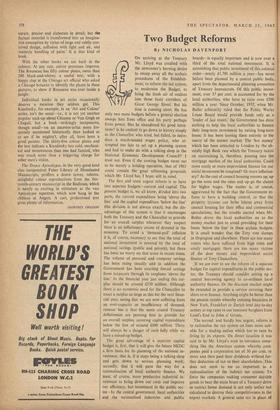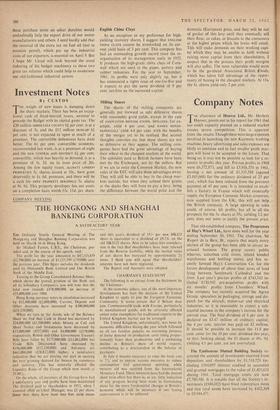Two Budget Reforms
By NICHOLAS DAVENPORT ON arriving at the Treasury Mr. Lloyd was credited with the newcomer's burning desire to sweep away all the archaic procedures of the Establish- ment, to reform the tax system, to modernise the Budget, to bring the fresh air of realism into those fusty corridors of Great George Street. But his time is running short. He has only two more budgets before a general election sweeps him from office and his party perhaps from power. Has he abandoned his good inten- tions? Is he content to go down to history simply as the Chancellor who tried, but failed, to intro-. duce a much-needed wages policy, who at- tempted too late to set up a planning system and had to make do with a talking shop in the National Economic Development Council? I trust not. Even if the coming budget turns out to be merely a holding operation, that of 1963 could contain the great reforming proposals which Mr. Lloyd has, I hope, still in mind.
The first and most urgent reform is to have two separate budgets—current and capital. The present budget is, we all know, divided into two parts, the current expenditure being `above the line' and the capital expenditure 'below the line' (the division is not always exact), but the dis- advantage of this system is that it encourages both the Treasury and the Chancellor to provide for an overall surplus whenever they suspect there is an inflationary excess of demand in the economy. To avoid a 'demand-pull' inflation it is, of course, necessary to see that the total of national investment is covered by the total of national savings (public and private), but there has been no worry on that score in recent times. The volume of personal and company savings has been rising steadily and in addition the Government has been exacting forced savings from taxpayers through its surpluses 'above the line.' In the financial year just ending this sur- plus should be around £370 million. Although there is no economic need for the Chancellor to exact a surplus so large as this for the next finan- cial year, seeing that we are now suffering from an over-capacity or insufficiency of demand, rumour has it that the more crazed Treasury deflationists are pressing him to provide for an overall surplus, covering capital expenditure below the line of around £600 million. There will always be a danger of such folly while we have a mixed-up budget.
The great advantage of a separate capital budget is, first, that it will give the future NEDC a firm basis for its planning of the national in- vestment, that is, if it stops being a talking shop and gets down to serious planning work; secondly, that it will pave the way for a rationalisation of local authority finance. We want, of course, more productive industrial in- vestment to bring down our costs and improve our efficiency, but investment in the public sec- tor—by the central government, local authorities and the nationalised industries and public boards—is equally important and is now over a third of the total national investment. It is astonishing that public investment of this colossal order—nearly £1,700 million a year—has never before been planned by a central public body, apart from the departmental planning committee of Treasury bureaucrats. Of this public invest- ment, over 37 per cent. is accounted for by the local authorities, who have to raise over £500 million a year. Since October, 1955, when Mr. Butler arbitrarily ruled that the Public Works Loans Board would provide funds only as a `lender of last resort,' the Government has done nothing to help the local authorities to finance their long-term investment by raising long-term loans; it has been leaving them entirely to the mercy of the money market. The 'hot money' which has been attracted to London by the ab- surdly high Bank rate which the Treasury insists on maintaining is, therefore, pouring into the mortgage market of the local authorities. Could more costly or more improvident finance for our social investment be imagined? Or more inflation- ary? As the cost of council housing mounts up, up go the rents and the rates and up go the claims for higher wages. The matter is, of course, aggravated by the fact that the Government re- fuses to have a building control, so that the property tycoons can bribe labour away from council housing for their office and commercial speculations; but the trouble started when Mr.
Butler drove the local authorities on to the money market just to avoid providing for their loans 'below the line' in these archaic budgets.
It is small wonder that the Tory vote slumps in Orpington and elsewhere. There are too many voters who have suffered from high rents and costly mortgages; there are too many victims of the dear money and improvident social finance of Tory Chancellors.
If we are ever to see the reform of a separate budget for capital expenditures in the public sec- tor, the Treasury should consider setting up a central borrowing agency to co-ordinate local authority finance. Or the discount market might be extended to provide a service covering their short-term finance. Anything might be better than the present system whereby cunning financiers in New York, Frankfort or Zurich lend day-to-day money at top rates to our innocent burghers from Land's End to John o' Groats.
The second, and hardly less urgent, reform is to rationalise the tax system on lines more suit- able for a trading nation which has to earn its living by its exports. On direct taxation it was said to be Mr. Lloyd's wish to introduce some- thing like the American system whereby com- panies paid a corporation tax of 50 per cent. or more and then paid their dividends without fur- ther deduction of tax to their shareholders. This does not seem to me so important as a rationalisation of the indirect tax system.. To force the companies making consumer durable goods to bear the main brunt of a Treasury drive to restrict home demand is not only unfair but calculated to destroy their competitiveness in the export markets. A general sales tax in place of these purchase taxes on select durables would undoubtedly help the export drive of our motor manufacturers and others. I need hardly add that the removal of the extra tax on fuel oil (not to mention petrol), which put up the industrial costs of our exporters, is essential on April 9. But I hope Mr. Lloyd will look beyond the usual tinkering of his budget machinery to these two great tax reforms which could help to modernise our old-fashioned industrial system.



































 Previous page
Previous page